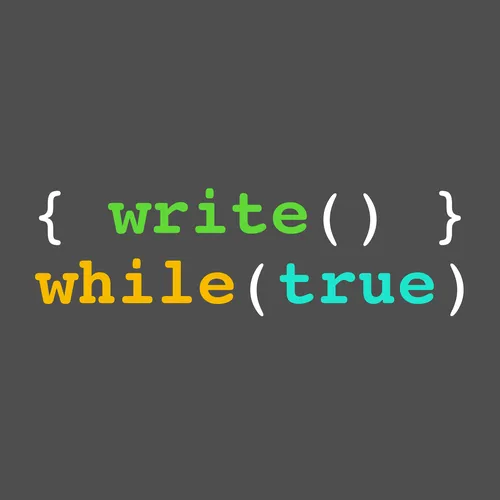
Write While True
Write While True is a writing podcast for programmers. Each episode is a writing exercise or prompt. Sit down at a keyboard and cue us up. When the show is over, it's time to write.
- Update frequency
- every 7 days
- Average duration
- 7 minutes
- Episodes
- 46
- Years Active
- 2021 - 2025

26. Making Makes a Maker
I decided to do a four-part series on the lessons I learned from Art & Fear by David Bayles and Ted Orland.
This week, in part three, I want to talk about a quote about what art means to the maker.

25. Stopping vs. Quitting
I reread the book Art and Fear by Bayles and Orland and they had so many ideas for how to get people to make art, that it worked for me to start my blog going again, and then ultimately restarting th…

24. Thousands of Variations
One of the things that got me back to podcasting after a two year break was rereading Art & Fear by David Bayles and Ted Orland.
This time, while I was reading it, I kept a lot of notes and found fou…

23. Take a Break
We just passed the second anniversary of the break that I didn’t come back from right away.
I know exactly what was going on. I had a lot of travel to visit family and for work and it was just hard t…

22. Harvest Your Journals
When I was done with a journal, I’d put it on the shelf with others. I do a good job of making sure to transfer anything important to a real tracking system at the end of the day, so there wasn’t muc…

21. Dedicated Journals
I’ve been using a paper journal for years. Even when I worked on big teams, I still kept a separate journal with my personal daily tasks and schedule. For years, I just used a single journal for ever…

20. Extemporaneous Writing
When I was 13, my mom got me an electric typewriter for Christmas. She was a secretary, and she taught me how to touch type, and she wanted me to have something to practice on. But unfortunately, whe…

19. Prompt Your Morning Pages
If you are just coming to this podcast on this episode, I have to tell you that I talk about Morning Pages a lot. It was the subject of Episode 1. Listen to that for the full description of what they…

18. Taking My Own Advice
I thought it would be a good idea to re-listen to all of my podcasts from season one. Each of them is only about 10 minutes and there are only 15 episodes, so it doesn’t take too long.
This had two e…

17. Make Art with Friends
I thought about things that were going well, where I had a lot of output, like my programming projects. One thing I realized that helps a lot is that I am proud of that work. Doing it is a self-estee…

16. Try and a Teacher Will Appear
I did season one of this podcast a couple of years ago.
I did 15 episodes. They were about some of the basics of building up a writing habit, and then I stopped. In this season, I am going to explore…

15. Combine Identities
I made this podcast, but I wanted to self-host, so I learned how to do that with s3 and wrote my own way to get analytics. So, Podcasting leads to programming. And then I wrote up a blog about that p…

14. Spaced Repetition
Last week I encouraged you to collect general knowledge. Viking trade routes, anime, Rothko paintings, architecture, typography, bluegrass standards — where ever your interests lead you.
For these ki…

13. New Ideas
New ideas are combinations of old ones.
- A Technique for Producing Ideas [amazon affiliate link] by James Webb Young
- Mad Men: “Think about it …” [amazon affiliate link] (on Amazon, free with Prime)

12. Keep a Topic List
In the past, when I set goals to write more frequently, I was always stopped by not having ideas ready for what to write about. Or when I got one, I didn’t have a systematic way of collecting them. I…

11. Quantity and Quality
I know that a lot of my episodes are variations on the theme of quantity. In episode one, I asked you to write morning pages every day. In episode 4, I asked you to make a schedule where you write mu…

10. Finding My Why
The exercise this week is to think about your “why”? I don’t think it’s wrong to write for money or fame, but if you’re an amateur like me, I’d find something easier to attain.

9. Deprivation
I don’t use a lot of social media, but if I don’t plan my time intentionally, I’ll find myself watching a lot of YouTube.
It’s not that I think that my life should be 100% dedicated to making new th…

8. Lower the Bar
This episode is about lowering the bar, and I’m tempted to just say to go do it and sign off.
I won’t do that, but I am going to keep the bar on this episode pretty low. Now, you’re probably thinking…

7. Find Your Voice
Lately, I’m thinking a lot about what this podcast sounds like. I’m new to podcasting and I’m very aware that I have a lot to do to sound more natural, but that’s not exactly what I’m talking about.
- …